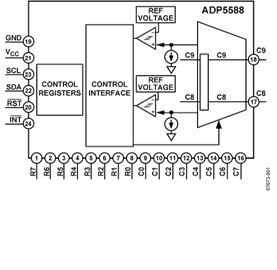

- Manufacturer Part Number : ADP5588
- Manufacturer : AD
- Description : Mobile I/O Expander and QWERTY Keypad Controller
- Series : ADP5588
- Reference Price : USD 0.816
- Our Price : We have a better price, contact us by email
- Product Type : Mobile I/O Expander & Keypad Controller
- Function : -
- Current Suggest : Production
- Status : Production
- RoHS Status: -
- Voltage: -
- Feature: -
- Package Case: -
- Temperature Range: -
- Packing: Reel/Tray/Tube
- Standard Packing Quantity: -
- Country of Origin: -
- Other Part Number : ADP5588
- Shipping methods : DHL FEDEX UPS TNT
- Delivery Time : Ship within 1 day.
- Manufacturer Production time : 6-8 weeks (Normally have stocks)
- Weight : 0.001KG
Contact us to check the best price and real time inventory quantity for ADP5588. If you need any more information about ADP5588, you can also send us by email. Our email is [email protected], we will reply you in 12 hours.
- 18-GPIO port expander or 10 × 8 keypad matrix
- GPIOs configurable to GPIs, GPOs, and keypad rows or columns
- Dual light sensor inputs (C8 and C9)
- I2C interface
- I2C register read auto increment
- 1.8 V to 3.0 V operation
- Keypad lock capability
- Open-drain interrupt output
- Key press and key release interrupts
- GPI interrupt with level programmability
- Programmable pull-ups
- Key event counter with overflow interrupt
- 50 μs debounce on the reset line and GPIs
- 1 μA typical idle current, 55 μA typical polling current drain for one key press
- Small 4 mm × 4 mm LFCSP package
The ADP5588 is an I/O port expander and keypad matrixdesigned for QWERTY type phones that require a large keypadmatrix and expanded I/O lines. I/O expander ICs are used inmobile platforms as a solution to the limited number of GPIOsavailable in the main processor.
In its small 4 mm × 4 mm package, the ADP5588 containsenough power to handle all key scanning and decoding and flagthe processor of key presses and releases via the I2C® interfaceand interrupt. It frees the main microprocessor from having to monitor the keypad, thereby minimizing current drain andincreasing processor bandwidth. It is also equipped with a buffer/FIFO and key event counter to handle and keep track of up to 10 unprocessed key or GPI events with overflow wrap and interrupt capability.
The ADP5588 has a keylock capability with an option to triggeror not trigger an interrupt at key presses and releases. All communication to the main processor is done using one interrupt lineand two I2C-compatible interface lines. The ADP5588 can beconfigured to have a keypad matrix of up to 8 rows × 10 columns(a maximum of 80 keys).
When used for smaller keypad matrices, unused row and column pins can be reconfigured to act as general-purposeinputs, outputs, or light sensor inputs. R0, R1, R2, R3, R4, R5,R6, and R7 denote the row pins of the matrix, while C0, C1, C2,C3, C4, C5, C6, C7, C8, and C9 denote the column pins. At power-up, all rows and columns default as GPIs and must be programmed to function as part of the keypad matrix, GPOs, or light sensor inputs. In addition to keypad and GPIO functionalities, C8 and C9 can also be configured as light sensor inputs.
When configured as keypad lines, the function of the C8 andC9 lines is straightforward: the control interface disconnectsthese lines from the comparator inputs, disables the light sensor comparator, and connects them to the keypad columns of thekeypad matrix. When used as light sensor comparator inputs, the control interface disconnects these pins from the keypad,enables the comparators, and connects these lines to the comparator inputs. Two external capacitors (0.1 μF) are required when these pins are configured as light sensor inputs. When used as GPIOs, these pins are removed from the keypad and the light sensor interface, and the light sensor comparators are disabled, along with the logic for the sensors.
Applications
- Keypad and I/O expander designed for QWERTY type phones that require a large keypad matrix
At least one model within this product family is in production and available for purchase. The product is appropriate for new designs but newer alternatives may exist.



